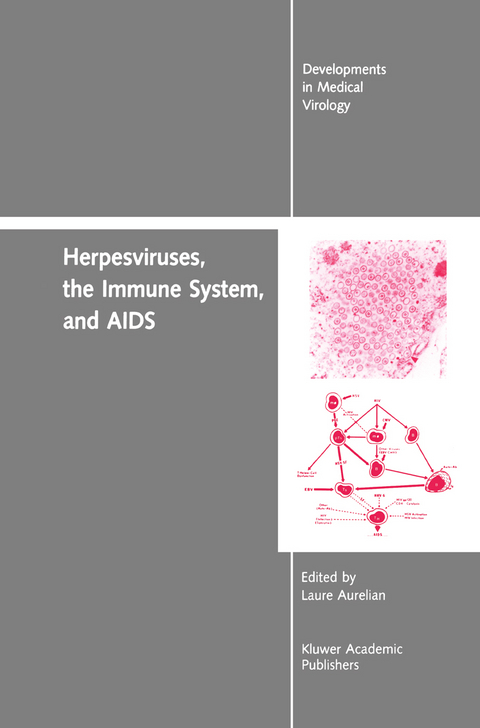
Herpesviruses, the Immune System, and AIDS
Springer (Verlag)
978-0-7923-0803-4 (ISBN)
Several of the opportunistie infeetions caused by herpesviruses include encephalitis, chorioretinitis, hairy leukoplakia, esophagitis, enteritis, colitis, Burkitt's lymphoma, primary CNS lymphoma, zoster, and there has even been speculation about the role of CMV in the pathogenesis of Kaposi's sareoma (15,16). Furthermore, the herpesviruses, partieularly CMV and EBV have been known to be strongly associated with immunosuppression, partieularly of cell-mediated immune functions, which further supported the hypothesis that herpesviruses may contribute to the immune defects that eharacterize AIDS.
1. Epidemiologic and Serologic Evidence for a Role of Herpesviruses in HIV Infection.- 2. The Cell Biology of Antigen Processing: A Review.- 3. Molecular Aspects of Human B and T Lymphocyte Responses to HIV.- 4. The Control of Human Herpesvirus Infections by Cytotoxic T Lymphocytes (CTL): A Comparison to AIDS Virus Specific CTL.- 5. CMV Infections and Immune Responses.- 6. Immunobiology of EBV Infections and Potential Interactions with HIV.- 7. The Role of Immunosuppression in Herpes Simplex Virus Pathogenesis and its Relationship to AIDS.- 8. Natural Resistance to Herpes Simplex Virus Infections: The Macrophage-Interferon Axis.- 9. Innate Resistance to HSV-1 Infection: Mouse Macrophage Inhibition of Viral Replication.- 10. Potential Interactions if HIV and the Neurotropic Herpesviruses in AIDS Encephalopathy.- 11. Herpesviruses as Co-Factors in the Immunopathogenesis of AIDS.- 12. Trans-Activation of the Human Immunodeficiency Virus (HIV) Promoter by Heterologous Virus Infection.- 13. Subunit Viral Vaccines: Prophylactic and Therapeutic Use.- 14. Antisense Nucleic Acid Analogues as Potential Antiviral Agents.
| Erscheint lt. Verlag | 31.7.1990 |
|---|---|
| Reihe/Serie | Developments in Medical Virology ; 6 |
| Zusatzinfo | XVI, 377 p. |
| Verlagsort | Dordrecht |
| Sprache | englisch |
| Maße | 156 x 234 mm |
| Themenwelt | Medizin / Pharmazie ► Medizinische Fachgebiete ► Mikrobiologie / Infektologie / Reisemedizin |
| Studium ► Querschnittsbereiche ► Infektiologie / Immunologie | |
| Naturwissenschaften ► Biologie ► Mikrobiologie / Immunologie | |
| ISBN-10 | 0-7923-0803-4 / 0792308034 |
| ISBN-13 | 978-0-7923-0803-4 / 9780792308034 |
| Zustand | Neuware |
| Informationen gemäß Produktsicherheitsverordnung (GPSR) | |
| Haben Sie eine Frage zum Produkt? |
aus dem Bereich


